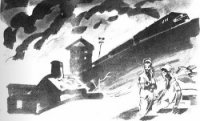Operation Nemesis: The Assassination Plot that Avenged the Armenian Genocide - Bogosian Eric (мир книг .txt) 📗
From his earlier reconnaissance, Tehlirian knew that this was not the usual pattern. Downing a glass of cognac, he grabbed his pistol and raced downstairs. As he took hold of the latch on the gate that led to the street, he found it was frozen. Tehlirian could not escape the courtyard. Running back into the house, he found the servant and dragged her into the courtyard, but as the minutes ticked by, the gate would not budge. By the time the latch was dismantled and Tehlirian lurched toward the Tiergarten, Talat was nowhere to be seen.
Tehlirian states in his memoirs, “Having lost my mind, I pulled at the door almost to the extent of destroying it—in vain.”41 He feared the worst—that Talat had been alerted to the plot and slipped through their fingers. In a funk, he headed for the stakeout outside Djemal Azmi’s tobacco store. As he made his way there, he sensed a greater police presence on the street. Or was his mind playing tricks on him? Why had Talat broken with his usual schedule and left so early that morning? Had he been tipped off that he was being watched? The men outside the tobacco store reported no activity. Tehlirian returned home to find a locksmith repairing the street gate.
The following morning Tehlirian phoned Natali and in a shaky voice insisted on meeting with him. Natali rushed to Tehlirian’s room, where the nervous young man described how the broken lock had prevented him from pursuing Talat and that he suspected Talat had left the city altogether. Natali assured his protege that there was no reason to believe Talat was suspicious and that in fact it was better that things had gone as they did. Natali pointed out that Tehlirian had left piles of evidence around his room, evidence that would suggest the larger conspiracy. Better to clean things up, because once the deed was done, there would be no time to cover their tracks. Natali poured out a glass of cognac for Tehlirian and made a toast to “our sacred mission.” When he left, he took with him the binoculars as well as a pile of letters and notebooks.
The following morning a bleary-eyed Tehlirian once again stationed himself at his desk, scrutinizing Talat’s building through the narrow slit in the curtains. In the street beneath his window, all was normal as people dashed to their early-morning jobs. The servant arrived with Frau Dittman in tow. The landlady was freshly made up and spoke in a rapid chatter. Tehlirian felt panic. Had he been caught spying? He concentrated on her words. What was she saying? Something about the gate, the latch. Ah, she was apologizing for the broken latch! Frau Dittman pressed a new key into Tehlirian’s hand. Relieved, he thanked her profusely. There was an uncomfortable silence and the young widow left, flustered. Tehlirian glanced around the room. It was bare; no evidence of his real occupation remained.
By noon, Talat had not yet reappeared. Number 4 Hardenbergstrasse seemed vacant. Had Talat ever returned at all? Another knock at the door. A messenger was delivering a note from his compatriots. A coded cipher received from Paris once again had confirmed that Talat was living at 4 Hardenbergstrasse under the name Ali Salih Bey. Tehlirian was feeling ill. All appearances indicated that the building across the street had been vacated. He had made a deal with Natali to call him every day. This would be the way he signaled his superior. On the day that he received no call, Natali would know that Tehlirian had gone into action, would know that it was time to abandon Berlin.
Another endless night followed the fruitless day. Across the way, behind the curtains, a lamp was switched on. Then off. Nothing more. The next day Tehlirian kept his vigil until eleven p.m. but saw no one. Now he was certain that Talat had escaped. Another night passed. Tehlirian became feverish. He was wracked with nightmares. He obsessed about the lock on the gate. Why had that happened? Was it fate? What did he think he was doing? Talat was gone, he had failed. Without Talat to focus on, the walls of his room closed in on him.
Thoughts of his mother haunted Tehlirian continuously. In his dreams they walked to church together, shared bread and honey. Tehlirian wrote, “She was like a blind woman, feeling my face, my body.” In his dreams, the sun broke through the clouds and Tehlirian’s mother ran from him. He would wake up in the morning to find his pillow wet with tears. “My nerves were wrecked.” The constant vigilance and tension were taking their toll on a man who was not well to begin with. With each dawning day, he splashed cold water onto his face from the dresser washbasin, pulled on his clothes, and resumed his vigil at the window.
At one point during the days prior to the assassination, an automobile rolled up before 4 Hardenbergstrasse and the man the conspirators had named “dark face” emerged, accompanied by a beautiful woman. The two entered the building. There was no doubt in Tehlirian’s mind that this woman was Talat’s wife, Hayriye Talat Bafrali. This was evidence that Talat was still here. Two hours later, his body stooped with fatigue, Tehlirian allowed himself a phone call to the Tiergarten Hotel, where the others were staying. He was told that a ciphered letter had arrived by air mail from America. “The comrades confirmed that Talat lives in Berlin at Hardenberg 4 under the pseudonym Ali Salih Bey and asked that the Talat affair be ended through all possible measures. This telegram was the answer to our question sent in early February.”42 They understood this to mean that they were to bring the operation to a conclusion: kill Talat.
On the morning of March 13, the woman Tehlirian identified as Talat’s wife emerged from the house and made her way up the street. He wrote in his autobiography thirty years later: “I knew from Istanbul that she had abilities and was involved in her husband’s affairs.… It was said that she had a great influence on her husband.” So he decided to abandon his observation post and follow her as she headed for the Tiergarten, where she made her way to a fountain. Tehlirian observed her from a distance. It was a surreal moment. Struck by her beauty, Tehlirian had to reconcile this with the fact that “with her knowledge and on the command of her husband, tens of thousands like her were condemned to die from starvation in the deserts and to wither away in Turkish harems.”43
The following morning, as Tehlirian was finishing his tea, Talat stepped out onto his balcony across the way. “The monster” was still here. “Talat hung his head.” Tehlirian mused, “Apparently life was not easy for him after the crime he committed in the desert.”44 The former minister slipped back into his suite. Since it was after ten in the morning, Tehlirian knew that Talat would soon exit the building and go for his stroll toward Uhlandstrasse. Sure enough, Talat, dressed nattily in a striped shirt, suit, and overcoat but no hat, appeared at the door of the building and descended to the street. Tehlirian found his pistol, checked it, thrust it in his pocket, and rushed down the stairwell. The landlady would later note that Tehlirian left the building around eleven a.m.
From across the boulevard, Tehlirian could see Talat was traveling along his usual southeasterly path. The moment of truth had arrived. Before pulling the trigger, it was crucial for Tehlirian to get a good look at Talat’s face in order to make a positive identification. It was equally important not to alert his target in any way, to catch his quarry unawares so that he could not avoid the kill shot. Tehlirian had to hit his target square.
As the world speeded up, and with his pulse pounding in his temples, Tehlirian slipped along the opposite side of the street, duplicating Talat’s path across the Hardenbergstrasse. The two men, each on his side of the street, progressed in this manner for almost three blocks. Tehlirian knew that Talat would cross the street at some point within the next hundred yards, probably after passing the imposing Berlin University of the Arts. Tehlirian was now fifty steps ahead of Talat. He jogged across the boulevard, then turned and began striding toward his victim. Swinging his cane as he walked, Talat displayed no sense of caution. Ten feet separated the men, now five, now they were almost upon each other. Their eyes met.




